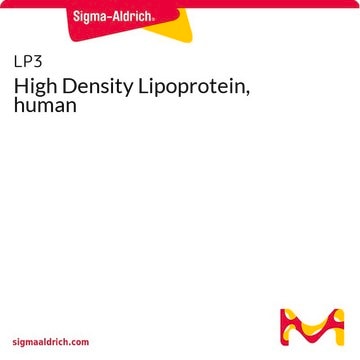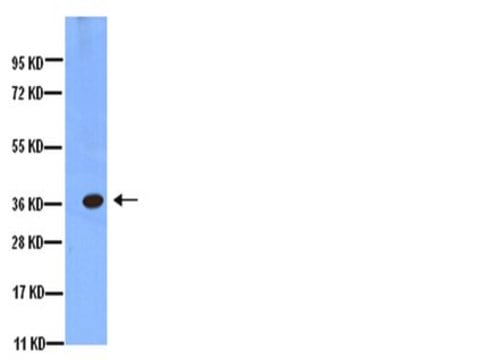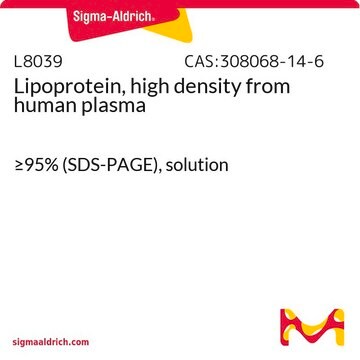MAK192
Cholesterol Efflux Assay Kit
Sufficient for 100 Fluorometric tests
Sign Into View Organizational & Contract Pricing
All Photos(2)
About This Item
UNSPSC Code:
12161503
Recommended Products
application(s)
cosmetics
food and beverages
pharmaceutical
detection method
fluorometric
relevant disease(s)
cardiovascular diseases
storage temp.
−20°C
General description
Reverse Cholesterol Transport (RCT) is the mechanism by which the peripheral lipid burden is reduced by transport to liver and its fecal excretion. The first important step in RCT is the cholesterol efflux from macrophage-derived foam cells present in atherosclerotic plaques. The cholesterol efflux is critical for the maintenance of net cholesterol balance in arterial walls and in the reduction of proinflammatory responses triggered by lipid-laden macrophages.
application
Cholesterol Efflux Assay Kit has been used in cholesterol efflux assay.
Features and Benefits
Compatible with high-throughput handling systems.
Suitability
Suitable for the determination of cholesterol efflux in cells.
Principle
The Cholesterol Efflux Assay Kit is a high-throughput screening assay that measures cholesterol efflux in cells using fluorescent-labeled cholesterol (λEx = 482 nm/ λEm = 515 nm). It is suitable for serum, isolated, or recombinant lipoprotein samples. It may also be used to screen small molecules for their effect on cholesterol efflux and therefore, may be a valuable tool in drug discovery programs.
Kit Components Only
Product No.
Description
- Labeling Reagent
- Equilibration Buffer
- Reagent A
- Reagent B
- Cell Lysis Buffer
- Positive Control
- Serum Treatment Reagent
signalword
Warning
hcodes
Hazard Classifications
Eye Irrit. 2
Storage Class
10 - Combustible liquids
flash_point_f
188.6 °F - closed cup
flash_point_c
87 °C - closed cup
Choose from one of the most recent versions:
Certificates of Analysis (COA)
Lot/Batch Number
Don't see the Right Version?
If you require a particular version, you can look up a specific certificate by the Lot or Batch number.
Already Own This Product?
Find documentation for the products that you have recently purchased in the Document Library.
Customers Also Viewed
Lipoprotein apheresis affects lipoprotein particle subclasses more efficiently compared to the PCSK9 inhibitor evolocumab, a pilot study.
Lappeg?rd K T, et al.
Transfusion and Apheresis Science : Official Journal of the World Apheresis Association : Official Journal of the European Society for Haemapheresis, 57(1), 91-96 (2018)
Christian Abendstein Kjellmo et al.
Journal of clinical lipidology, 12(1), 193-202 (2017-11-18)
Bariatric surgery has been shown to reduce cardiovascular events and cause-specific mortality for coronary artery disease in obese patients. Lipoprotein biomarkers relating to low-density lipoprotein (LDL), high-density lipoprotein (HDL), their subfractions, and macrophage cholesterol efflux have all been hypothesized to
Bariatric surgery improves lipoprotein profile in morbidly obese patients by reducing LDL cholesterol, apoB, and SAA/PON1 ratio, increasing HDL cholesterol, but has no effect on cholesterol efflux capacity.
Kjellmo C A, et al.
Journal of Clinical Lipidology, 12(1), 193-202 (2018)
Huifeng Pi et al.
Journal of cellular and molecular medicine, 23(8), 5259-5269 (2019-05-24)
The formation of fat-laden foam cells, which contributes to the fatty streaks in the plaques of atheromas, is an important process in atherosclerosis. Vascular smooth muscle cells (VSMCs) are a critical origin of foam cells. However, the mechanisms that underlie
Knut Tore Lappegård et al.
Transfusion and apheresis science : official journal of the World Apheresis Association : official journal of the European Society for Haemapheresis, 57(1), 91-96 (2018-02-06)
Lipoprotein apheresis and proprotein convertase subtilisin/kexin type 9 (PCSK9) inhibitors are last therapeutic resorts in patients with familial hypercholesterolemia (FH). We explored changes in lipoprotein subclasses and high-density lipoprotein (HDL) function when changing treatment from lipoprotein apheresis to PCSK9 inhibition.
Our team of scientists has experience in all areas of research including Life Science, Material Science, Chemical Synthesis, Chromatography, Analytical and many others.
Contact Technical Service










